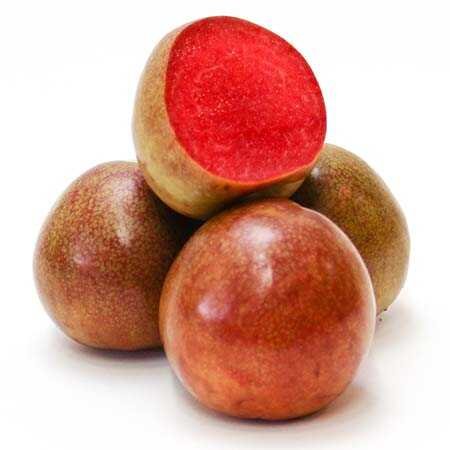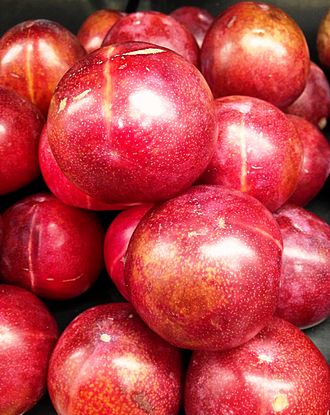What is Plumcot? Read to Know About its Detailed Health Benefits!
Undoubtedly, the arrival of the summer season signifies lengthy days by the pool, dinners directly cooked from the grill, and a fascinating exhibition of funky fruit hybrids at our regional grocery stores! Many of you must have seen donut peaches and cherry plums at our local grocery marts. However, we have found another stone fruit blend for you, usually known by the name of a plumcot.
What is a plumcot, in your opinion? Plumcots are stone fruits that are an apricot-plum mix-breed. Besides having a sweet flavor, fuzzy skin, and an extraordinary resemblance with plums, these fruits were first sold in 1989.
So, if you wish to learn more about this nourishing fruit item, which may reduce the chances of several diseases due to its high vitamin and mineral content, feel free to read further!
What is a Plumcot?

Source: Mvfruit.com
As mentioned above, this mixed-breed fruit product was first introduced by plant breeders Luther Burbank and Floyd Zaiger in the late 19th century and the beginning of the 20th century. Whatsoever, their renewed efforts brought the 50-50 apricot-plum mix to market. Currently, this stone fruit hybrid comes with nearly all sorts of variations, including the flavor grenade pluots and the dapple dandy.
Do Plumcots Constitute a Healthy and Nutritious Fruit?
Plumcots have moderately fuzzy, plum-coloured skin with spirited red flesh that is juicy and sweet. These fruit hybrids have only 30 calories per serving and brag a whooping 3g dietary fiber and lose fat, 10 percent of one’s daily Vitamin C requirements, and 6 percent of daily Vitamin A needs.
This means that consuming only a couple of these fruits would fulfill about a quarter of your daily fiber requirements with a free vitamin boost!
As they have an equal plum-to-apricot ratio, consuming one to two cups of plumcots is essential in order to make the best of their benefits. In addition, it would be best to look for plumcots with smooth and firm skin. Pluots can either be sliced and consumed directly or added to a fruit salad.
Nevertheless, you should avoid consuming too much of this fruit if you’re on a low-sugar diet concerning its high sugar content. Some dominant health benefits of the plumcot tree have been mentioned below.
Reduced Aging Symptoms
Beta-carotene is an antioxidant found in plumcot that provides protection to cell membranes and fatty acids from damaging free radicals. This helps our body to combat various aging symptoms, such as unwanted wrinkles and loss of skin elasticity.
Apart from this, the elevated number of other antioxidants in plumcot also enhances circulation and cell metabolism to promote skin elasticity and keep wrinkles and acne-related problems out of reach.
Improved Digestion
As plumcot is rich in dietary fiber, it can have many notable benefits for the digestive system. Fiber intake speeds up the absorption of nutrients and smoothens bowel movements, thus keeping the digestive system healthy. Not only this, plumcots are known to reduce the chances of fiber-related disorders.
One pluot contains around 3g of dietary fiber, which can significantly increase the water content of stool. As a result, the stool gets softer and larger and passes quickly through the intestines, thus reducing the risks of constipation. Moreover, pluot’s insoluble fiber content adds additional mass to the fecal matter and makes it easily passable.
Reduced Risk of Diabetes
The fiber content of pluots plays a significant role in accelerating the blood sugar contents in the body, thus reducing the chances of type 2 diabetes. As plumcots’ rank is pretty low in the glycaemic index, their consumption is ideal for regulating blood sugar levels.
Additionally, phytonutrients found in plumcot control blood glucose content and regulate the rise in insulin levels between meals. So, a diabetic patient might benefit from this delicious fruit-based item!
Enhanced Immunity
As plumcot tree has an elevated Vitamin C content, it may help enhance the body’s immune functions. Regulating Vitamin C intake stimulates the body’s white blood cell production, which helps fight several deadly microorganism-related infections that may cause harm to the body.
Conclusion

Source: Simple.wikipedia.org
Plumcots are generally low in calories and contain plenty of dietary fiber. Just one serving of this fruit contains 10% vitamin C and 6% vitamin A that our bodies need daily.
Moreover, it is full of valuable antioxidants, which help combat aging by eliminating free radicals. Its high fiber content can assist one with bowel movements and can also be helpful to those with diabetic conditions.
The plumcot fruit doesn’t transport well, so it’s rare to see it in supermarkets, especially outside its area. Your best bet will likely be purchasing through online stores or a farmers’ market. However, you could also try specialty grocery markets that pride themselves on having a wide variety of fruits.
Share this content:














Post Comment